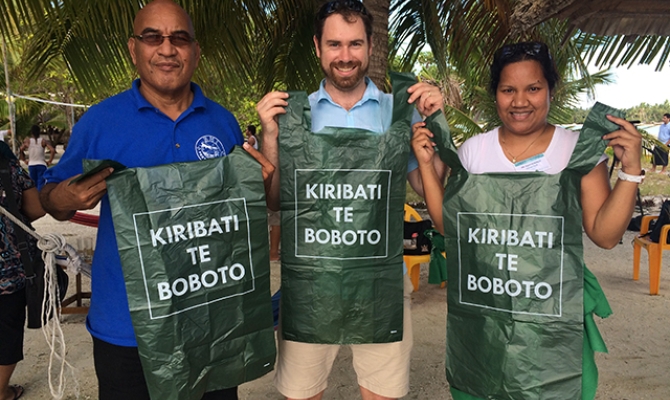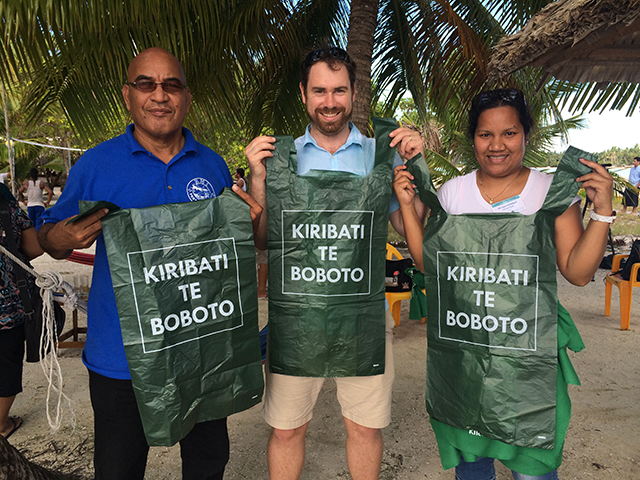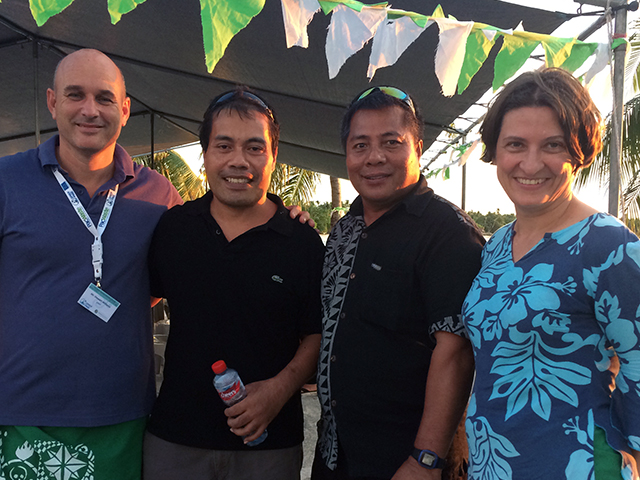
Waste Management and Pollution Control
Globally, hazardous waste management is a pressing and complicated issue, and nowhere is it more challenging – or urgent – than on the low-lying atolls of the Pacific.
At last week's Third Annual Steering Committee Meeting of the PacWaste project, representatives from 13 Pacific island countries gathered in Tarawa, Kiribati to learn more about how the vulnerable island nation is seeking to improve the health of its environment and people through sustainable waste management initiatives.

PacWaste is a €7.85 million, four year project funded by the European Union and implemented by the Secretariat of the Pacific Regional Environment Programme (SPREP) to improve regional hazardous waste management across the Pacific.
Ms Ileana Miritescu, Programme Manager, Infrastructure and Natural Resources at the European Union Delegation for the Pacific, Suva noted the strong enthusiasm from all meeting participants:
"While PacWaste has four main areas of focus – asbestos, healthcare waste, E-waste and integrated atoll waste management – a further priority for the project is to foster links between Pacific island countries and encourage information sharing on sustainable waste management. Locating this important regional meeting in Tarawa proved to be extremely valuable in this regard. I'd like to extend our sincere appreciation to the Government of Kiribati for making us feel so welcome and for showcasing some of the innovative waste management activities taking place in Tarawa."

Over the course of the Steering Committee Meeting and associated workshops, participants discussed the work programme for the next 12 months of the PacWaste project and had the opportunity to share information about waste management practices and key issues in their respective countries.
One highlight of the programme was a workshop and presentation, organised by the Kiribati Ministry of Environment, Lands and Agriculture Development (MELAD) and New Zealand's Ministry of Foreign Affairs and Trade (MFAT), on the successful implementation of the pre-paid 'green bag' in Kiribati. The public awareness component of the green bag programme – which included public performances and plays – was critical to its success. At the workshop, PacWaste delegates had the opportunity to see one of the performances and discuss elements of effective public awareness campaigns in a Pacific island context.
PacWaste Project Manager, Mr Stewart Williams, said that learning about the history of the 'green bag' programme in Kiribati was very useful, especially given forthcoming plans to launch a similar pre-paid bag scheme in Majuro, Republic of Marshall Islands:
"As we embark on an ambitious work programme for the coming 12 months, PacWaste will be taking into consideration the important lessons learned in Kiribati, not just on pre-paid bags, but also on atoll landfill systems, E-waste, container deposit legislation and other aspects of integrated atoll waste management."
The event also highlighted the critical importance of actively engaging women and young people in waste management initiatives, especially given their proximity to waste generation – and segregation – at the household level.

At a special celebration held at the Kiribati Parliament buildings in Ambo, Mr Moannata Ientaake, Permanent Secretary for MELAD, applauded PacWaste for its results on the ground over the past two years and noted the scope of activities planned for the future:
"In Kiribati, the PacWaste project is supporting healthcare waste management initiatives, undertaking asbestos removal works and supporting an E-waste pilot project to safely extract and export valuable or hazardous materials from old electronic and computer equipment. The Government of Kiribati looks forward to continuing our work with the European Union and SPREP to protect the people and the environment of Kiribati from the impact of hazardous waste."
The Third PacWaste Steering Committee Meeting and associated workshops took place from 20 – 22 October, 2015 in Tarawa, Kiribati. Representatives from Cook Islands, Federated States of Micronesia, Fiji, Kiribati, Republic of the Marshall Islands, Nauru, Niue, Palau, Samoa, Solomon Islands, Tonga, Tuvalu and Vanuatu were in attendance, alongside delegates from the European Union, SPREP and observers from New Zealand's Ministry of Foreign Affairs and Trade (MFAT) and the Japanese Technical Cooperation Project for Promotion of Regional Initiative on Solid Waste Management in Pacific Island Countries (J-PRISM).
For more information on the PacWaste project, please visit www.sprep.org/pacwaste or contact Amber Carvan on [email protected]
At last week's Third Annual Steering Committee Meeting of the PacWaste project, representatives from 13 Pacific island countries gathered in Tarawa, Kiribati to learn more about how the vulnerable island nation is seeking to improve the health of its environment and people through sustainable waste management initiatives.

PacWaste meeting participants learned about the successful implementation of the pre-paid 'green bag' in Kiribati. Photo: A.Carvan/SPREP
PacWaste is a €7.85 million, four year project funded by the European Union and implemented by the Secretariat of the Pacific Regional Environment Programme (SPREP) to improve regional hazardous waste management across the Pacific.
Ms Ileana Miritescu, Programme Manager, Infrastructure and Natural Resources at the European Union Delegation for the Pacific, Suva noted the strong enthusiasm from all meeting participants:
"While PacWaste has four main areas of focus – asbestos, healthcare waste, E-waste and integrated atoll waste management – a further priority for the project is to foster links between Pacific island countries and encourage information sharing on sustainable waste management. Locating this important regional meeting in Tarawa proved to be extremely valuable in this regard. I'd like to extend our sincere appreciation to the Government of Kiribati for making us feel so welcome and for showcasing some of the innovative waste management activities taking place in Tarawa."

Group photo of participants at the Third Annual PacWaste Steering Committee Meeting in Tarawa, Kiribati. Photo: A.Carvan/SPREP
Over the course of the Steering Committee Meeting and associated workshops, participants discussed the work programme for the next 12 months of the PacWaste project and had the opportunity to share information about waste management practices and key issues in their respective countries.
One highlight of the programme was a workshop and presentation, organised by the Kiribati Ministry of Environment, Lands and Agriculture Development (MELAD) and New Zealand's Ministry of Foreign Affairs and Trade (MFAT), on the successful implementation of the pre-paid 'green bag' in Kiribati. The public awareness component of the green bag programme – which included public performances and plays – was critical to its success. At the workshop, PacWaste delegates had the opportunity to see one of the performances and discuss elements of effective public awareness campaigns in a Pacific island context.
PacWaste Project Manager, Mr Stewart Williams, said that learning about the history of the 'green bag' programme in Kiribati was very useful, especially given forthcoming plans to launch a similar pre-paid bag scheme in Majuro, Republic of Marshall Islands:
"As we embark on an ambitious work programme for the coming 12 months, PacWaste will be taking into consideration the important lessons learned in Kiribati, not just on pre-paid bags, but also on atoll landfill systems, E-waste, container deposit legislation and other aspects of integrated atoll waste management."
The event also highlighted the critical importance of actively engaging women and young people in waste management initiatives, especially given their proximity to waste generation – and segregation – at the household level.

Mr Stewart Williams (SPREP), Mr Taulehia Pulefou (MELAD), Mr Moannata Ientaake (MELAD) and Ms Ileana Miritescu (European Union) at the PacWaste welcoming reception at the Parliament buildings in Ambo, Tarawa. Photo: A.Carvan/SPREP
At a special celebration held at the Kiribati Parliament buildings in Ambo, Mr Moannata Ientaake, Permanent Secretary for MELAD, applauded PacWaste for its results on the ground over the past two years and noted the scope of activities planned for the future:
"In Kiribati, the PacWaste project is supporting healthcare waste management initiatives, undertaking asbestos removal works and supporting an E-waste pilot project to safely extract and export valuable or hazardous materials from old electronic and computer equipment. The Government of Kiribati looks forward to continuing our work with the European Union and SPREP to protect the people and the environment of Kiribati from the impact of hazardous waste."
The Third PacWaste Steering Committee Meeting and associated workshops took place from 20 – 22 October, 2015 in Tarawa, Kiribati. Representatives from Cook Islands, Federated States of Micronesia, Fiji, Kiribati, Republic of the Marshall Islands, Nauru, Niue, Palau, Samoa, Solomon Islands, Tonga, Tuvalu and Vanuatu were in attendance, alongside delegates from the European Union, SPREP and observers from New Zealand's Ministry of Foreign Affairs and Trade (MFAT) and the Japanese Technical Cooperation Project for Promotion of Regional Initiative on Solid Waste Management in Pacific Island Countries (J-PRISM).
For more information on the PacWaste project, please visit www.sprep.org/pacwaste or contact Amber Carvan on [email protected]